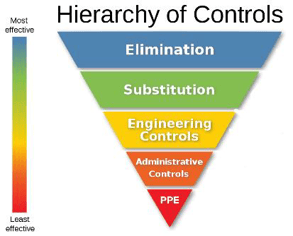What is a hazard?Anything capable of causing harm or damage to people, property, environment in any possible way, is called a hazard. It is defined as “a source of exposure to danger” that can lead to injuries, illnesses or damage to property or the environment. |
|
What is hazard awareness?Hazard awareness is a repetitive learning behaviour. The well-being of yourself and others depends on the awareness of potential and existing hazards. Through training and planned task observations, we learn to identify and be more aware of hazards. To be more aware, we should learn from others’ mistakes to prevent us from making ours. Hazard awareness is more of a pro-active state of mind than a reactive state of mind. |
|
Types of hazards:
|
How can we prevent hazards? |
|
| A competent person should perform a specific HIRA (Hazard Identification Risk Assessment) before any work begins. | |
|
|

